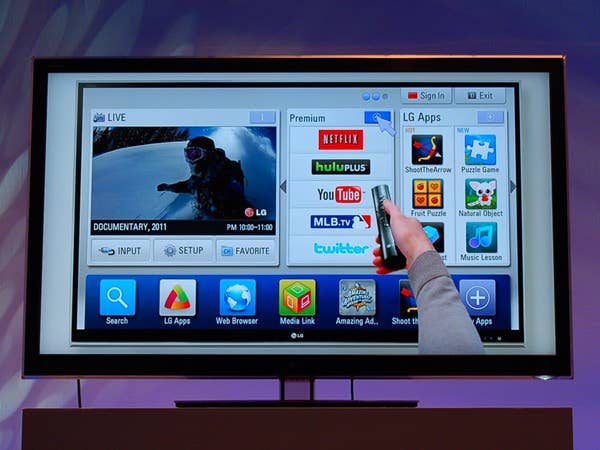Crystal Gazing: What to Expect in 2013
Leading industry analysts join with our staff to prognosticate about what the future holds for the games business
In just a few short days, 2013 will be upon us. Happy New Year to our readers! It's been an incredible year of growth for GamesIndustry International and for the global games business as a whole; ignoring huge retail declines, there are more ways than ever for developers to get their games into the hands of players. If the next 12 months are as exciting as the last 12 have been, we're in for a wild ride.
So what does 2013 have in store for the games industry? We polled several top game industry analysts and asked the GamesIndustry International staff to weigh in as well (see sidebar section on right side below). If even half of these predictions come true, it's sure going to make attending 2013's major trade shows quite entertaining.
Jesse Divnich, EEDAR
1. Smart Televisions - They Will be Kind of a Big Deal

We've recently seen major players such as Sony, Google, Samsung, Valve, OnLive, and Zynga throw their hats into the Smart Television ring. While accessing interactive entertainment directly through your television is still in its infancy, all the major players are preparing for what could be a significant shift to circumvent the need for an intermediate device (cable box and/or game console) to regulate and control content through your television.
We expect this year's CES in January to showcase an abundance of concept products that plan to bring high quality interactive entertainment directly through your television and as these concepts become more material, we'll begin to see strong support from the largest content creators such as Zynga, Rovio, and the major console publishers.
We'll likely not see any material news or products launch until late 2013, but eventually the big trend in late 2013 will be Smart Televisions and their ability to revolutionize the way we consume interactive entertainment.
2. Digital Gaming Revenue to Surpass Physical
We are nearly there already, but by the end of 2013, more revenue will be generated through the consumption of digitally purchased software and micro-transactions than physically purchased software.
We've all seen this trend coming and it should be no surprise on its eventual occurrence, but we suspect that 2013 will be the year that digital revenues surpass physical revenues in the Western Markets.
3. GTA V Will Be Number One
Last year, I made a similar prediction, but unfortunately the title was delayed into 2013.
If GTA V is released in the spring of 2013, it will become the number one grossing title of 2013 for all of interactive entertainment. Consumers have been starved for a great AAA single player experience for some time and we believe there is enough pent up demand for GTA to once again set some records.
4. Real-Time Multiplayer To Become A Driving Mobile/Tablet Feature
To date, the asynchronous multiplayer feature has been the most popular on the mobile and tablet devices. This has mostly been driven by a casual consumer base and a lack of sophisticated software to support proper real-time multiplayer sessions (along with proper RPG and stat tracking elements).
In 2013, however, we expect that real-time multiplayer or "synchronous multiplayer" will become an emerging popular feature. It will likely take a few big mobile/tablet titles to bring this prediction to light, but by the end of 2013, we expect that at least one, if not two, of the top ten selling mobile/tablet games will have a real-time multiplayer focus.
5. Mobile - The Biggest Year for Acquisitions and Layoffs
Last year we predicted there would be massive layoffs in the social gaming space. One of the few predictions we hoped we'd be wrong about. We were not.
In 2013, we expect to see more independent developer acquisitions in conjunction with layoffs of those that couldn't make the cut.
Much like the social gaming space in 2012, early investors into mobile start-ups are starting to put pressure on their investments to either position themselves for acquisition, or begin to realize significant profit returns. With the supply of independent developers being larger than the demand for acquisition, we anticipate that we'll begin to see sizable layoffs and studio closures in the mobile space in 2013.
It's a sad prediction to make, one we hope doesn't actualize, but with the data in front of us it is clear that the mobile/tablet landscape is likely to go through a significant transformation in 2013.
Michael Pachter, Wedbush Securities
1. Wii U Feeling Price Cut Pressure
Wii U will get a price cut-I think that the Wii U will sell out for the first several months, but think that once the PS4 is announced at a competitive price, the Wii U will look overpriced. At the same time, we will probably see Xbox 360 and PS3 discounted to under $200 at some time in 2013, so the Wii U will have to price closer to those consoles to remain competitive.
2. New Bungie Game to Charge for Multiplayer

The Bungie game will charge for multiplayer-I think that the phenomenal success of Call of Duty has taught Activision a lesson: multiplayer is extremely popular, and it's impossible to profit if you allow people to play for free. It's too late to do anything about CoD (they tried-and failed-to monetize with Call of Duty Elite), but it's not too late to introduce a new IP that is single player only, and that requires a subscription to play multiplayer. I think the Bungie game is perfect for this, as Bungie has a huge following, and the game is likely to sell 5 - 10 million units for the single player experience. I believe that Activision and Bungie will be happy if 2 - 3 million people subscribe to the multiplayer service, as that figure is likely to grow over the years if Bungie can keep the game interesting and fresh. My expectation is that there will be regular content drops, probably monthly or more frequently, so subscribers will get something for their money.
3. PS4 Announced Sooner Than You Think
The PS4 will be announced during the first quarter, and will launch before year-end-expect Sony to try to get a head start on Microsoft with an announcement before E3, likely in the first quarter of 2013. I think that PS4 will be built from commodity components, allowing Sony to charge a competitive price (likely $399 or less), and will be packed full of multimedia functionality. Sony has made great progress with PSN, and an improved dashboard would help gamers discover all of the features of the new device.
4. No Next-Gen Xbox in 2013
Expect the Xbox 720 announcement at E3-I don't think the Xbox 720 will come out in 2013, but think that Microsoft will announce the device at E3, with a launch date in early 2014. The problem with a 2013 launch is that the feature set is not yet decided, and I think that the box will be able to receive television programming live, meaning that Microsoft has to negotiate with cable TV providers to deliver the box and integrate its functionality into the existing cable infrastructure. That's pretty complicated, so it could take time. Expect the Xbox 720 to be subsidized by cable TV providers, much like cell phones are subsidized by carriers, with a likely retail price under $200 (and maybe under $100).
5. GTA V May See Slower Than Usual Sales

Grand Theft Auto may struggle and sell “only” 20 million units-I think that conventional wisdom is that GTA V will attach to 25 percent of all Xbox 360s and PS3s out there (around 25 million units at launch mid-year), but it might have some trouble doing so for a couple of reasons: first, the game is primarily single-player, and the industry has morphed into a primarily multiplayer world; second, the game is launching the same year as next generation consoles, meaning that people who are willing to “wait” for the next generation are less likely to buy the game. If there is any franchise that defies logic, it's this one, so I could be completely wrong, but I think that people who love multiplayer will not be as likely to buy a primarily single-player game, limiting sales to “only” 20 million units or so. That's the price Rockstar pays for releasing games so far apart-the industry has moved away from them, and they haven't necessarily adapted.
David Cole, DFC Intelligence
1. The Bubble Bursts on Freemium Mobile
Smartphones and tablets exploded in the consumer mindset starting in mid-2011. These products are hot with all types of consumers. Unfortunately for serious content providers it has meant an explosion in development that far exceeds market demand. A premium mobile game is now one priced at $0.99. Most games are being given away for free with the goal to make money on advertising or an upsell (freemium). This is a market ready to collapse as the amount of investment dollars going into the space far exceeds consumer willingness to purchase. Long-term, DFC Intelligence believes that consumers, especially in the tablet space, will become more willing to buy the products they like upfront. In 2013 we are anticipating some big success stories in game apps priced in the $5-10 range.
2. Continued Investor Disconnect with the Game Revenue Model

The downward trend in retail sales is expected to continue in 2013. This has been very predictable and actually for the first 11 months of 2012, retail software revenue for all the current game systems were outselling the DFC Intelligence forecasts we presented at the start of 2012, even the Wii and PSP. Of course, all this means is the decline is not quite as bad as we predicted. Overall the industry shows strong consumer demand and the growth in digital sales has been impressive. Unfortunately, investors trade largely off of retail sales. The current generation of game systems is in decline and the industry will need new hardware systems to jump start sales at retail. Unfortunately for 2013 there is not a lot on the horizon.
3. A Year for Acquisitions
DFC Intelligence believes that there is strong consumer demand for games and that this demand is closely tied to strong video game brands. Many of the companies with the strongest brands have struggled to take full advantage of those brands and seen their value decline. Going into 2013 we see potential for investors to try and grab some bargains.
It is impossible to say who will buy what, but we can say that from an investment perspective the category is a lot less expensive than it was several years ago. Since 2008 the stock of traditional game companies has declined significantly. Take-Two Interactive is worth less than half of what it was when Electronic Arts tried to buy them four years ago. For its part, Electronic Arts' performance has been even worse. EA is worth about a quarter of what it was in 2008. Nintendo has had one of the biggest collapses, seeing its market value go from almost $80 billion to the $15 billion range. Of course, then there is the nightmare collapse of Zynga whose stock went from almost $15/share in early 2012 to an end of year price in the sub-$3 range.
4. Tepid Mass Market Reaction to Wii U Causes Sony and Microsoft to Hold Off on Launching New Systems

Back in 2007 Nintendo was named marketer of the year by Advertising Age for the launch of the Wii. Right now, there is no danger of that happening with the Wii U. From announcing the system 18 months before its launch to the continued inability to communicate the strengths of the system, it seems Nintendo has lost its way with communicating to mass market consumers. A great strength of Nintendo was its ability to communicate with both its core audience AND more mainstream consumers. The launch of both the Wii U and the 3DS XL were very subdued affairs that indicate a lack of confidence in the product.
Of course, the Wii U sold out to the initial core base of Nintendo fans and is likely to be in short supply well into 2013. The problem is that an alarming number of people in the broader mass market are still unaware of the Wii U. It is telling that the week the Wii U launched, Microsoft was touting impressive sales for the Xbox 360. Much of these consumers were probably potential Wii U buyers. The long term issue for the industry is a weak performance by Nintendo means that there is less pressure on Microsoft and Sony to release new game systems. The industry needs a stronger Nintendo to keep it on edge.
5. More Breakout Successes on XBLA and PSN Cause Developers to Flock Towards Online Console Products
Minecraft on Xbox Live Arcade was a huge success. The Xbox 360 and PlayStation 3 have now built a large audience that is very comfortable making digital purchases. The right product can now generate substantial sales on console systems without ever having to be launched at retail. We think 2013 will see even more success stories in digital only console titles. Of course, as usual, we expect that developers will overflood the market with product resulting in more losers than winners. However, that is just the nature of the beast in the game industry.
Billy Pidgeon, Inside Network
1. The Audience for Games is Still Growing But Could Peak in 2013
Games are a mainstream medium for the mass market. There are more people playing games today then there have ever been. There are more than 250 million gamers on Facebook alone. I do not believe the hardcore gamer base has decreased, but I do believe they are playing games differently. Gamers are playing fewer AAA games for longer periods of time and multiplayer is a preferred play mode for many. Gamers are extending play in their favorite games with add-on content, and can access high quality games on more platforms then ever before.
"It will be very difficult for small developers without heavy funding to break into mobile or Facebook"
Billy Pidgeon
Many gamers who started out playing relatively simple casual games are more sophisticated, expect better gameplay and are willing to pay for it. And they don't have to turn to consoles to get better games.
2. The Next Generation of Consoles is Here But Will Have Low Impact
We're likely to see a next-generation console release in 2013. I believe it will be the successor to Xbox 360. Sony could (and should) reboot with a new console, but will probably continue to push PS3. Xbox 360 will still be the dominant platform for sales of packaged games.
3. Console Games Aren't Going Away, But They're Not Coming Back to Reclaim Past Numbers
Although sales of Wii U and the successor to Xbox 360 will be respectable in comparison to past console launches, games will be a disappointing category for traditional retailers in 2013. The unit and revenue numbers on boxed games were not good in 2012, and they'll likely be worse in 2013. GameStop will be hit particularly hard, as the market for packaged pre-owned games is deflating.
But the dedicated console business has changed. Revenue from console hardware and packaged software for consoles will increase somewhat with new consoles being launched. Uptake for eighth generation consoles will be much slower than in previous cycles, and attach rates of packaged games will be weaker. The seventh generation has had an overlong lifecycle, and the delay in launching next generation will see dedicated consoles lose still more market share in the hardcore games sector to convergent platforms such as PC, tablets and, to a lesser extent, smartphones.
4. Double-Digit Growth for Digital Revenue, Again
Revenue from digital game distribution has never been accurately reported. Rather, it's been consistently under-reported. Digital revenue from paid downloads, item transactions and services generated on all platforms -- consoles, PC, tablets and smartphones -- actually more than made up for the 2012 decreases noted in aggregate hardware and packaged software revenue. Based on my research and observations, I believe digital revenue will continue to grow at double-digit rates. I am less certain that vendors and publishers will provide corraborating numbers to back this up.
5. Games On Smartphones and Facebook Will Close The Quality Gap
More games for smartphones and Facebook will be higher quality, and players are developing more sophisticated tastes. Expectations are higher, and budgets are rising in accordance. It will be very difficult for small developers without heavy funding to break into mobile or Facebook. We'll also see more games delivered to television from PC, cloud and downloadable.

